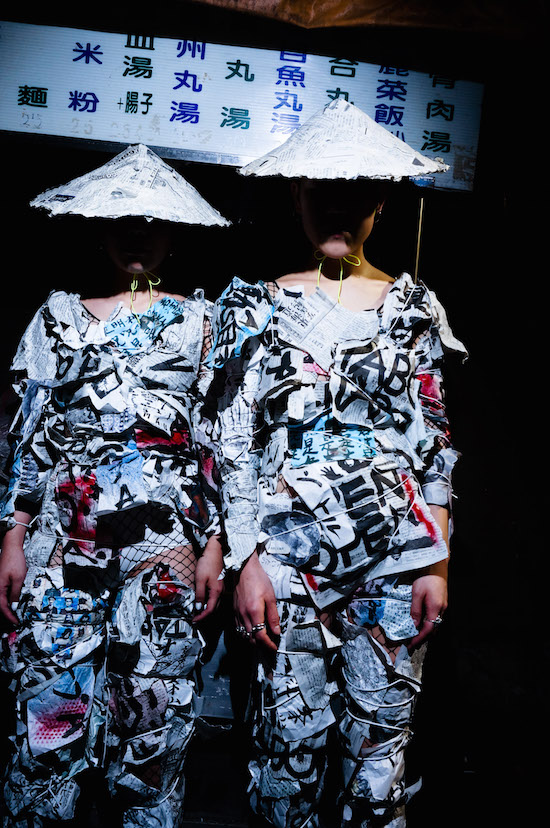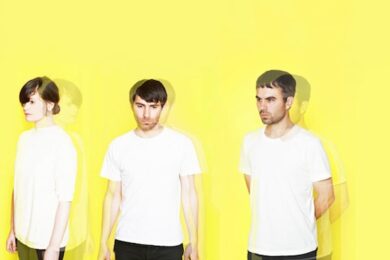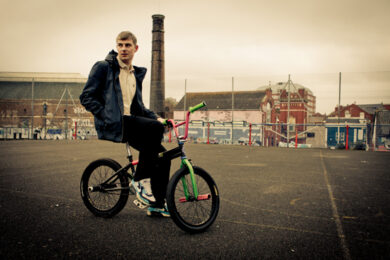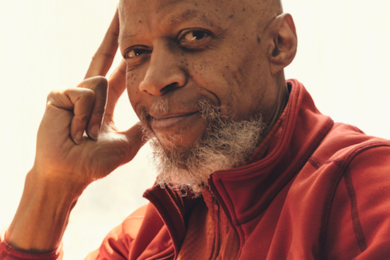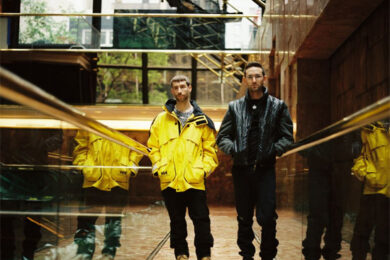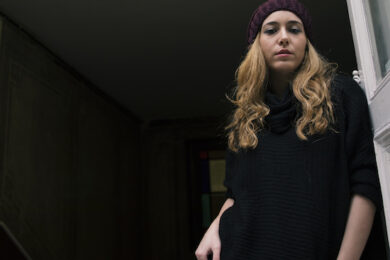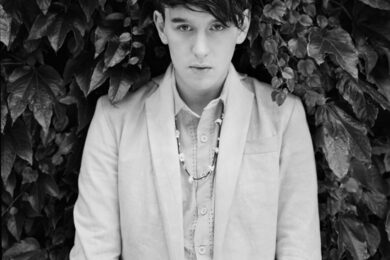Photograph courtesy of Billa Baldwin
In the midst of Leipzig’s frankly hallucinatory Wave-Gotik-Treffen, you quickly spot that the bands are fighting a losing battle for attention. Ostensibly a music festival, the annual W-G-T is, in fact, look-at-me cosplay on a massive scale. It’s like a corner of late ’80s Leeds run through CGI cloning until pansticked, black-crinolined hordes are carpeting the city like the Persian army in 300.
Since it’s apparently exclusively about dressing to kill (or being dead, but with great lipstick) around here, it’s pretty splendid to see what happens on Saturday night down at Gothic Pogo, the W-G-T’s cooler, sexier little minimal-wave/post-punk adjunct. Long before the headliners (Minny Pops, Dutch electro pioneers and ex-Factory hands) roll up, a sizeable cluster of punters are, remarkably, not only facing the stage but looking at it, too.
And no wonder. The Tokyo duo group A are coolly whipping up an electrical storm of clanking beats, swooping violin and vocals that turn on a dime from cryptic chants to baleful howls. What’s more, they’ve easily got the best clobber – rice farmer hats, big white knickers and clear plastic ponchos dotted with Man Ray découpage – in town. By the time they turn up at the merch stand post-set, there’s a small flock of people waiting; by the end of the night, every other act on the bill has made heartfelt little speeches of admiration. Packing up the plastic ponchos backstage, Sayaka Botanic (violin) and Tommi Tokyo (vocals, keyboards, a haircut edgy enough to make Dalston blanch) take in the kudos; doubtless pleased, but resolutely offhand.
Speaking via Skype a few months later at the start of a second European tour that will include their first UK dates and launch a new recording, 70+a=, Botanic and Tokyo bat back my questions with shrugs, conspiratorial laughs and demotic, glottal-stopped English honed in their student days in London spent hanging out with The Horrors and Bo Ningen.
Botanic, who pays the bills working at a printing company, is a graduate of London College of Fashion, where she studied textile and fabric design. Tokyo, currently a web designer, "didn’t really study anything in London; I just went to English language school", she says, deciding against the expense of design school in London and instead studying visual design and photography at Kuwasawa Design School in Tokyo.
The two had, Tokyo recalls, "kind of seen each other at clubs and gigs in London, but we didn’t actually meet until Sayaka came back to Tokyo [in 2012], and we both went to a gig of some mutual friends from England. We all went for a drink after and talked about music and our lives and stuff. We formed group A that night.
"I’d been in a few bands before: Happy Bunny [in London, with various Horrors], and when I came back to Japan I formed a post-punk band, DAncer DAnger, where I played bass and sang. At the time I met Sayaka, my drummer had moved to Osaka, so I was looking for people to form another band."
Botanic recalls: "We were three people at first, and then the vocalist quit to move to England with her boyfriend. But we got offered a lot of gigs, and when she left we still had the gigs, so we thought we should make new songs without her."
"When we were three, we used to sound more… really abstract," Tokyo adds. "Much more noise, and we used lots of tapes because none of us really could play an instrument. We just played some tapes and put some noise on top. The girl who left for London used to bring her favourite book and scream into the mic."
"I love music, and I’ve always hung out with people who make music, but I never thought I’d be in a band," says Botanic, adding that her violin skills are, she feels, rudimentary. "My mum loved classical music, and she wanted me to be a classical violinist. She taught me the basics, but I hated it, so I quit when I was five or six, and I didn’t play again until group A."
"I’ve always wanted to be in a band with people who can’t play anything," Tokyo says. "It’s definitely more fun to teach yourself. That’s what the musicians that I love used to do, back in the ’70s and ’80s."
Fun aside, though, isn’t it a challenge to get what you want out of, say, house sound engineers?
"I thought people would be like that more than they are," Tokyo replies. "The thing is, I think men like to teach women. In Japan, men just really like girls like us making some noise and not knowing what we’re doing. So they come up and say, ‘Hey, look, just put this on and you can do that‘, or, ‘Hey, you should use this.’ And we’re, like, oh – thanks!"
"Everyone loves analysing what bands we like, too," Botanic adds. "After a gig, all the old guys come up to us and say, ‘Yeah, maybe you guys love Suicide, or maybe you guys love PiL, or maybe you guys love…[apparent in-joke pause] Throbbing Gristle’."
Tokyo nods: "It’s been 40 years since the four of them formed TG. Even if you don’t know TG, you must have heard loads of other bands who have been influenced by them. So of course people say: ‘You guys sound like TG, you sound like Cabaret Voltaire.’ And we’re like, absolutely, they are my most favourite bands. But they also mention bands we never thought we sounded like. Suicide – I never thought we sounded like them at all. Slits: when we were a trio, I kind of liked it: oh wow, we sound like Slits? But really, I don’t think so."
"I think it’s just the visual thing," Botanic adds drily.
And group A shows are nothing if not visual: tag-team action painting, wraparound projections and mixed media experimental stagewear ranging from knobbly white bodystockings to shredded-newspaper suits. But the bigger talking point (as noted by Time Out Tokyo and The Japan Times and for all I know every single Japanese language publication as well), and perhaps the prompt for the Slits comparison, too, is what group A don’t wear. Isn’t it risky to get naked, or semi-naked anyway, onstage?
They suppress smiles. "Why?"
When a performer takes her clothes off, it can be a fantastic show of strength, but it’s a tall order to make it work exactly as you intend. People may interpret it differently.
Tokyo: "Right. Yeah. Well, I’ve never really thought about it."
Botanic: "It’s just really natural to be naked."
Tokyo: "I mean it’s really unnatural for us to…"
"…wear clothes onstage," Botanic concludes, helpfully.
"No one’s really said anything about us being naked onstage," Tokyo shrugs. "Then again, I don’t totally feel comfortable when we’ve just finished a gig, and some men – or even close friends – just come up and say: ‘Wow, you’ve got big boobs.’ Like, wow, what do you want me to say? You know, like, thanks!"
Botanic: "But we just don’t care. We just don’t. Really. Care."
Tokyo: "If they want to look at my boobs, they can focus on my boobs. Fine!"
Botanic: "Boobs are just… this is just [gestures] an object. This is just meat – meat – here."
"People who are into music, who like our sound and our performance, they can see what we’re doing," Tokyo says. "If there are people who just want to come and see my boobs, that doesn’t matter. Because we can’t really see those kind of people. They don’t exist for us."
70+a= is the band’s third recording, following A in 2012 and INITIATION in 2013, all self-released in beautiful sleeves that conjure up Russian constructivism and Hannah Höch-esque collages, David Bowie and a mythical weeping rock. Last I checked, there wasn’t a pile of money in self-released experimental industrial-noise music. Do you think group A will become a full-time thing?
Botanic: "No. It’s really hard as a musician in Japan."
Tokyo: "I don’t think we should be professional musicians. I like the idea of being something else professionally and making music as a side project to our lives. But at the moment we don’t really like our part-time jobs, and we don’t really want to do anything else besides music. Hopefully it’ll work out when we move to Berlin next year."
When did Berlin become the plan?
Tokyo: "Quite recently. One of the reasons we formed group A was because after we came back from London, we just couldn’t stand being in Japan. We both really hate Tokyo. If you look at our social media and photos, we look like we’re having so much fun, but we’re not… With group A, there was the thought that if we did really well, it would definitely get us to move back to Europe or at least tour there and see our friends. And three years later, it’s happening."

Photograph courtesy of Wataru Fukaya
Europe: what’s the attraction?
Botanic: "The music."
Tokyo: "The club scene. And the music. In May we played in Berlin, and then we did the Gothic Pogo festival and I thought, ok, fuck it, I’m gonna move here. That was just heaven for me – amazing. I loved Gothic Pogo. All that 1980s minimal wave and post-punk – and people were dancing and singing to it. That would never happen in Tokyo. I mean, if I wasn’t Japanese, I think I’d really enjoy Japan. But because we’ve lived here for most of our lives, we can see all the bad things."
Botanic: "We’ve been seeing too much of the negative part of Japan."
Which is what?
Botanic: "It’s really hard for women in art, and musicians."
Tokyo: "Not just for women, but artists generally. Because the government doesn’t support art or music or culture. Japan has got amazing culture and history, but governments don’t give a fuck about it. They just destroy everything."
Would you ever want to live in the UK again?
Tokyo: "Not any more. I used to love it so much, but no, not really, because everything’s so expensive, and the British government is kind of the same as Japan’s, isn’t it? So I’m not really interested in Britain anymore."
70+a= was recorded live in July at Soup, a Tokyo venue. Are these seven tracks – bleeping, throbbing, sampled-dialogue-haunted and synth-frizzling, and, in ‘Suffocated’ and ‘B.O.R.E’, boasting some seriously catchy robot disco stomp – an indication of where group A are heading?
Tokyo: "Right now I’m focused on beats. I’ve been trying to figure out how to make them more interesting – how to make rhythms without drum machines. Unfortunately I don’t really know how to use those softwares, so at the moment I’m just using loads of effects on a drum machine."
Are drum machines ultimately too limiting?
Tokyo: [nods] "That’s why I’m trying to make a whole new set of unique beats. Obviously I get ideas from other records, but I have to figure it out by myself."
Botanic: "We sometimes construct the beats without any gear. No musical instruments. Just clapping hands, or voice, or some crackling noises or hitting a table or closing doors. We are always looking for another way to do things."
What about the vocals? In Leipzig, and at times on 70+a=, they’re impressively scary, especially coming from someone who looks so offhand.
Tokyo: "When I listened to some live recordings the other day, I was really surprised that my voice was so aggressive. I said to Sayaka, does my voice always sound like this? I think I’m even a bit scared! And she said, yeah, you always sound like that.
"I think one of the reasons the way I sing is getting stronger and more aggressive is to do with the lyrics, because I’ve been writing about the fucked-up Japanese government. So I when I sing, I get angry."
Are you a political band?
Tokyo: "No."
Botanic: "No."
Tokyo: "It’s not necessary to be political. To be honest, I try to not say anything really straight. Although on one of the songs on 70+a=, ‘Liar Lier’, I am saying bad things about the Japanese prime minister [Shinzō Abe]. Because he’s a liar. He’s been really bad, lying to us. Still, I guess I don’t want people to think we are political. Or that we’re against anything. Although of course we are against so many things."
What of their early friendship with The Horrors? It seems to have endured: Tom Furse remixed two of their tracks, ‘INITIATION’ and ‘Sioux’, for a digital single earlier this year, and group A will play Rhys Webb’s Cave Club night in London next month.
Tokyo: "The Horrors were the first people I got to know in London, and they got me into ’60s beat, freakbeat and psychedelia, garage and stuff. Hanging out with them I was hearing all kinds of rare and expensive 7" singles. I was really lucky to be involved in those party scenes. I think The Horrors are always going to be my… mentors, I guess you’d say. Without meeting them, I probably wouldn’t be in group A. I really respect them as musicians; I don’t think I’ve ever met people so passionate about music."
And the Bo Ningen connection?
Botanic: "I’ve been a friend of Bo Ningen for ages. The vocalist [Taigen Kawabe] and I were at the same high school in Tokyo, and I used to hang out a lot with the members before they started Bo Ningen. They’re amazing. They are to me like The Horrors are to Tommi. We used to listen to new music, go to gigs, see new bands. And drink a lot."
I’m willing to put some euros on group A having no shortage of Berlin scenesters keen to hang out with them. Maybe they can even pop down to Leipzig to see their black-clad friends.
Botanic smiles. "That was really unexpected, you know, that the older goth people liked us," she says.
Tokyo: "Because the Japanese goth scene is so different – it has got nothing to do with post-punk."
Botanic deadpans: "Yeah. It’s dead."
Tokyo: "In Japan it’s more focused on fetish, like S&M, and we call it visual kei. Really bad. I never got into goth at all; it had nothing to do with the music I listened to. So that’s why I was really surprised when we played in Leipzig, and there were goth people dancing to post-punk. I was like, wow, what is happening?"
Maybe they were taking a look at group A’s customised see-through plastic ponchos and having a serious rethink about crinolines. And maybe about buying some new records.
70+a= is self-released on December 1. group A continue their European tour at CAMERA JAPAN Festival in Rotterdam, The Netherlands tomorrow, September 23, with UK dates beginning at Islington Mill in Salford on October 8; for full details and tickets, and to pre-order 70+a=, head to their Bandcamp

